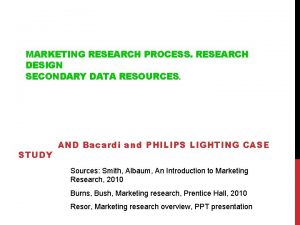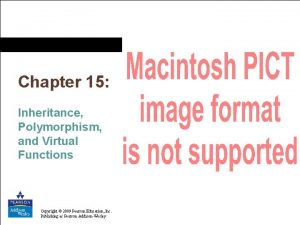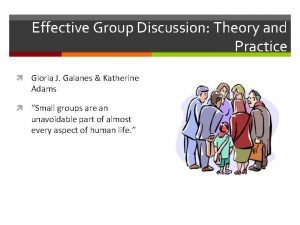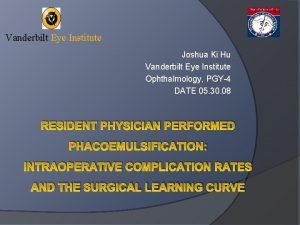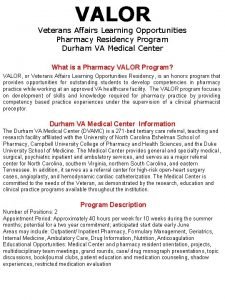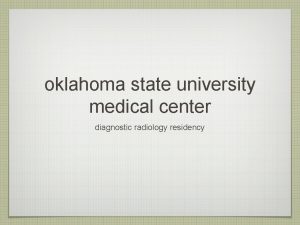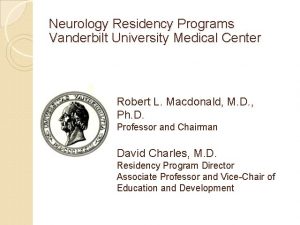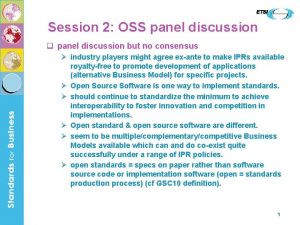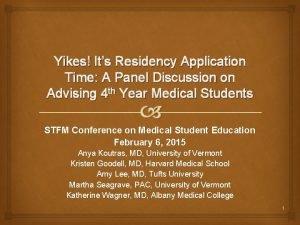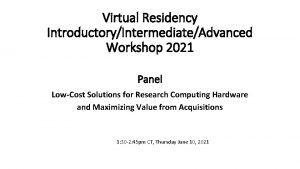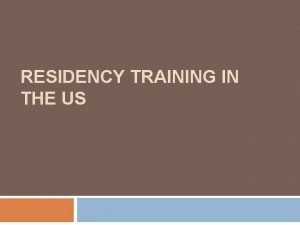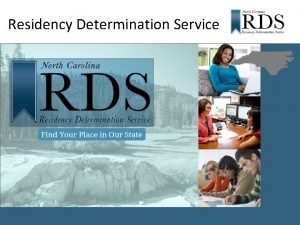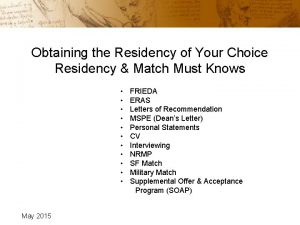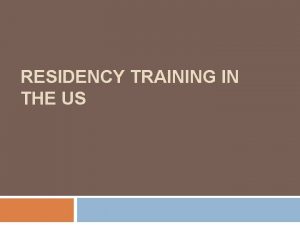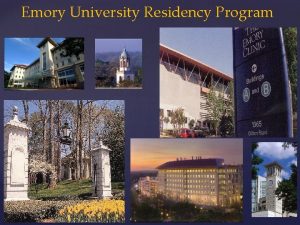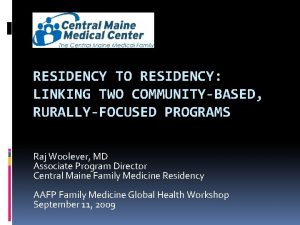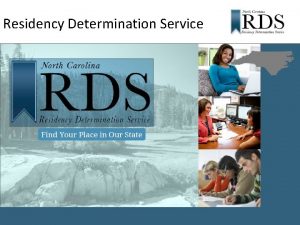ACIRef Virtual Residency 2020 Panel Discussion Marketing Communication


















- Slides: 18

ACI-Ref Virtual Residency 2020 Panel Discussion: Marketing, Communication, Demonstrating Impact/Value Kevin Brandt June 6, 2020

Kevin Brandt Director of Research Computing South Dakota State University Research Computing • Worked in research as an engineering under-grad. • Management since 2005, networking, enterprise server services, security (short stint) and research computing services. • Director since late 2019: shift from people management over to strategic needs and direction for research computing. • Ph. D candidate in Ag and Bio. Systems and Mechanical Engineering. (AI Deep Learning) • SDSU: Land Grant University with a broad research mission.

Roles: Air Traffic Controller, Facilitator, Educator, Persuader, Consultant, Trainer, Mediator, Technician, Collaborator. • Largest cluster within South Dakota higher-ed (NSF MRI) • Science DMZ (NSF CC*) • GPN CI Team (NSF CC*) • GPN Research Platform • GPN Augmented Regional Gateway to the OSG (NSF CC*)

1. How do you get the word out that your organization even exists, let alone what it's capable of? • Develop a communication strategy that focuses on engaging and informing your user base of the on-campus computational and storage resources available to current, … and perspective faculty members. • Work with your Office of Research and Sponsored Programs partnering with them on events. Volunteer to sit in on any town research related meetings – although most may not be research computing driven, there most likely will be networking opportunities. • Partner with Department Heads and Deans on department/group meetings where you could can disseminate Research Computing services information.

2. How do you explain to your administration why your organization is worth keeping and even expanding? • Build strong relationships with key stakeholders, including scientific leadership and faculty researchers, to ensure tight alignment with the strategic research goals of the university. • Quantitative and Qualitative - Metrics, publication outcomes, research grants served and growth trends. (Have an onboarding process that records research project information. ) Tell a story. Make your point about the data in a way that others can relate to. • Education - Provide valuable information for an informed decision. • Keep upper administration informed of major accomplishments within the unit and the growth trends. • Volunteer to support research programs that may not have a direct monetary benefit to RC. i. e. Involvement in training with several computationally themed REU Programs. • Sample report elements in the slides to follow,

New Cluster and SMP users by Department (example)

New Cluster and SMP users by role (example)

Cluster users (new instrument)

Cluster usage (example)

• You may also want to have stories to tell that illustrate FTE/ other resource utilization. (i. e. intellectual merit improvements that are as a result of/dependent on hardware, software or people resources). • Tailor your language to the needs of the audience.

3. What support do you have from the upper administration within the university? • Excellent! Funded centrally, through grant partnerships, Condo of Condos model. • Enterprise versus Research Computing. • Application needs of 1000’s people versus the needs of the few. However, the user numbers don't tell the whole story. (i. e. Grant funding impact perspective). • Again, make sure to establish a positive - professional relationship with upper administration. • Education - Keep upper Admin aware of major accomplishments, growth trends and new areas RC is growing into new science areas (AI, …). • Growth in FTE resources - Hopefully, you have fostered partnerships that can be leveraged for a possible letter of support from Faculty Leaders, Department Heads, Deans.

4. How do you identify and recruit new users? • Orientation • New Faculty and Graduate orientation. • Yearly symposium – Researcher driven. • Affinity groups based on research application area/science. • Value added website (currently being reworked) • Word of mouth among researchers. If you deliver and have a positive partnership with researchers and administrators, word of mouth may do the rest. • Free (In RC you will find that you must leverage sales skills. ) • We don’t charge back for consultation, computational cycles and for most storage. • Seek out partnerships on SDSU grant proposals regardless if there is immediate gain for IT. Where permissible, encourage grant budget allocations for FTE time, software and hardware. • Sell Research Computing as a service to help facilitate scientific discovery. “We are here to serve you!”.

5. What kind of outreach do you have for the campus community? Which type(s) of outreach or strategies do you find most effective? Do you have different plans for different audiences? • If role involves leadership, make sure you have a team where everyone is a team player and are positive, proactive, available and able to weather some complaints. • Turn complaints into opportunities. • Make sure you and your team are trained and are involved in the various CI communities. • Get ahead of the curve. Offer your resources to department heads to talk with faculty prospects or newly hired faculty on the research computing resources available to them. • Make sure your team is knowledgeable about new software and tools (AI). • Offer training sessions. Be aware that you may initially have very low attendance. If the content is valuable, it will grow by word of mouth/other. • Send out a newsletter with testimonials from researchers who have used your services.

5. What kind of outreach do you have for the campus community? • Which type(s) of outreach or strategies do you find most effective? • Do you have different plans for different audiences? • Value added website: Host useful and valuable material. • Advocates for Research Computing: Build a local “Researcher Campus Champions” group who are leaders' representative of your research community to act as an advisory group and an advocate. • Researcher driven Research Computing Symposium. • Tailor your discussion to your audience. Research Computing needs within the non-traditional disciplines can be different than those within the traditional sciences and engineering. • Faculty from nontraditional science fields may be less familiar with computational resources. (Facilitators can help with this. )

6. Do you have any FTE resources specifically assigned to communications for research computing services? What kind of outreach do you have for the campus community? • Communications is key, not only for Enterprise Services but also for Research Computing. • Research Facilitators have a strong element of communication – rooted in a wellround education giving them a better appreciation for a broader set of sciences. • External: We leverage our University Marketing and Communications.

7. Have you encountered any obstacles or resistance while performing university community outreach or user recruitment? • Leave your badge at home (not id card ) Refrain from being the IT Policy Cop if you are part of central IT. (However, policies do have to be followed. ) • Rumor Mill - Preconceived notions about IT control that don’t have merit. • Clearing up mis-conceptions: I’ve found most problems revolving about complaints (rumor-mill) can we resolved across the table through positive communication. • Knock on the Researcher’s door - Refrain from using email to settle issues. • Be a good listener and establish trust - Complaints usually translate into opportunities.

8. What organizations and/or training resources do you recommend to, • Fellow research computing professionals? • Any group involving the CI Communities, on campus groups, ACI-Ref VR, XSEDE, Ca. RCC, Educause, Carpentries, Cyber-Ambassadors, Women in HPC, Sci. Net, PEARC, Research Platforms, Regional Networks, Big Data Hubs. . . For those who aspire to be in a leadership role, the Educause leadership program is a good start – involvement other CI organizations. Active in Regional Network consortiums (GPN). Mentor a student – XSEDE EMPOWER Program • Researchers and graduate students? • Carpentries, entities such as the MBDH events, SCi. Net student volunteer, software carpentries etc.

Thank-you! Many thanks to Henry for hosting and the NSF for funding this workshop.
 Continuous panel vs discontinuous panel
Continuous panel vs discontinuous panel Zıt panel tekniği
Zıt panel tekniği Objectives of panel discussion
Objectives of panel discussion Panel discussion definition
Panel discussion definition Conclusion of panel discussion
Conclusion of panel discussion Group discussion tips in tamil
Group discussion tips in tamil Conclusion of distillation
Conclusion of distillation Has virtual functions and accessible non-virtual destructor
Has virtual functions and accessible non-virtual destructor Effective group discussion defines human communication as
Effective group discussion defines human communication as The courtyard of the old residency in munich
The courtyard of the old residency in munich Vanderbilt ophthalmology residency
Vanderbilt ophthalmology residency Va durham pharmacy
Va durham pharmacy Unm internal medicine residency
Unm internal medicine residency Umass memorial medical center pharmacy residency
Umass memorial medical center pharmacy residency St. john's episcopal hospital ophthalmology residency
St. john's episcopal hospital ophthalmology residency Halifax family medicine residency
Halifax family medicine residency Panama residency friendly nations
Panama residency friendly nations Osu radiology tulsa
Osu radiology tulsa Wake forest neurology residency
Wake forest neurology residency
